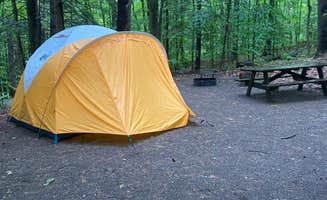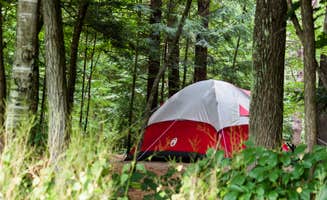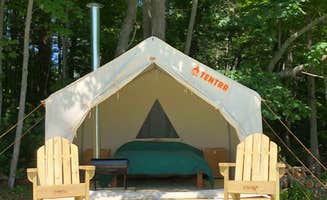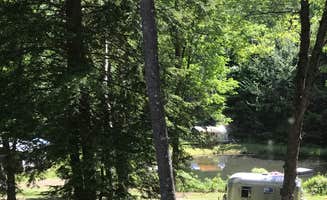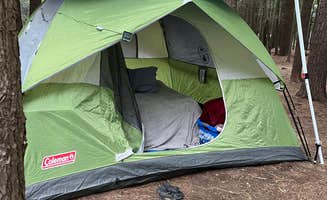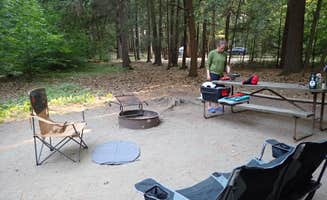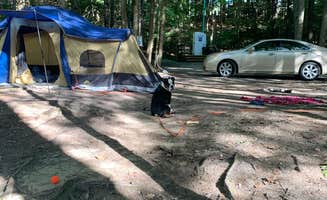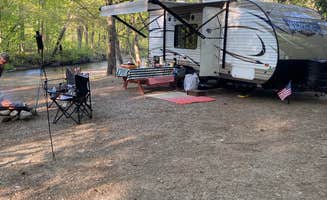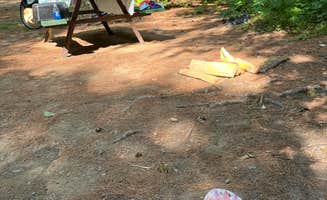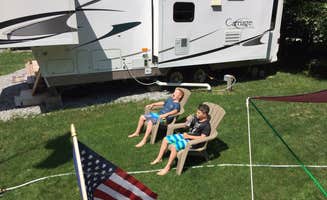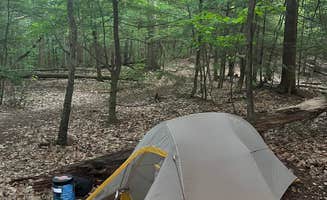Camping in the Connecticut River Valley between New Hampshire and Vermont offers unique environmental advantages due to the region's watershed elevation ranging from 300 to 1,500 feet above sea level. The valley serves as a natural wind corridor, often providing relief during summer heat waves. Most campgrounds near Cornish, New Hampshire operate seasonally from May through mid-October, with non-holiday weekdays typically offering better availability than weekends.
What to do
Swimming opportunities: Connecticut River access at Wilgus State Park Campground allows for cooling off during summer heat. One camper notes, "We loved walking the trail behind the campsites along the river to the beautiful vista views with a group with young kids, rented kayaks and fished from the boat launch."
Mountain exploration: Auto road access at Mount Ascutney State Park Campground provides an alternative to hiking. "We decided to drive up Mt. Ascutney to see the sunset our first night. Sunset was at 7:30. HOWEVER, the toll road also happened to close at 7:30, which we had ignored on the sign," shares a visitor who learned about timing restrictions.
Fishing: Pond and river options within short drives of most campsites near Cornish, New Hampshire. A Pillsbury State Park visitor warns: "Swimming in the stream is safe but the lake is loaded with leeches!" This practical insight helps campers choose appropriate swimming locations.
Blueberry picking: On-site seasonal harvesting at smaller campgrounds during summer months. A visitor to Tree Farm Campground mentioned "Even blueberry picking on site" among the amenities that made their stay enjoyable.
What campers like
Privacy between sites: Quechee State Park Campground receives high marks for site spacing. "Many sites are large and private. Bathrooms are clean. Hosts sponsor activities that are fun for all, like a balloon launch, cook outs, etc. Love it there," explains one reviewer, highlighting both physical spacing and community activities.
Convenient shower facilities: Pay showers with reliable hot water at most established campgrounds. At Mount Ascutney State Park, "There were coin-operated hot showers that were reasonably priced ($1 for 10 min). The campground also sold firewood ($6 for a good-sized bundle) and ice ($2 for a 5lb. bag) which can be purchased at the ranger station."
Lean-to options: Coolidge State Park Campground offers sturdy shelters for campers concerned about weather. "I loved this campground especially my site! I stayed at the Basswood lean to site. Private and well kept sites, clean bathrooms, friendly service, gorgeous Mountain View, gave me the real feel of camping outdoors," notes a satisfied visitor.
Kid-friendly amenities: Some campgrounds offer dedicated play areas and scheduled activities. At Crown Point Camping Area, "They have a lagoon for kids, with built in water rafts in the middle for kids to jump in. They have scheduled events that occur including family and adult only fire truck rides around the campground."
What you should know
Road noise impact: Many campgrounds in the region contend with interstate highway sounds. At Mount Ascutney, "Like many of the other reviews, I cannot give this a 5 star rating solely for the fact of road noise. We were in site 27 and it was a beautiful site but the road noise from interstate 91 was extremely loud."
Primitive facilities at some locations: Pillsbury State Park Campground offers a more rustic experience. "Pit toilets, sites are spacious, cell reception for Verizon isn't great. There's boat rentals, fishing, remote sites," explains a visitor, providing context on what to expect.
Cell service limitations: Coverage varies significantly by carrier and campground location. One Pillsbury State Park visitor noted, "Campsites have cell service" while another specified "cell reception for Verizon isn't great," highlighting the variability even within a single campground.
Cash requirements: Some state parks don't accept credit cards for on-site purchases. A Pillsbury visitor warns: "Everything is cash here, no cards accepted except when reserving a site online."
Tips for camping with families
Seek kid-friendly water features: Crown Point Camping Area offers structured swimming areas. "They have a lagoon for kids, with built in water rafts in the middle for kids to jump in... They have a playground with a large tent for parents to sit under with picnic tables," notes a visitor, describing facilities specifically designed for family enjoyment.
Consider cabin accommodations: For families new to camping, several campgrounds offer cabin rentals. "The cabin is great as it has a set of bunk beds and futon. Great for starting out with your kids," suggests a visitor to Wilgus State Park, pointing out the benefits for camping newcomers.
Look for ranger-led programs: Educational activities for children are available at select campgrounds. One visitor to Quechee State Park noted, "Rangers also run fun programs for children- my children churned butter and made popcorn over the campfire one night, and made tie dyed T-shirts the next (for no fee.)"
Explore swimming alternatives: Local swimming holes offer alternatives to campground water access. A Tree Farm Campground visitor mentioned finding "then awesome swimming hole at Buttermere falls next to Okemo" as a highlight of their trip.
Tips from RVers
Limited hookups at state parks: Most Vermont state parks lack full RV hookups. A camper at Quechee State Park noted, "There are no hookups but they do have a dump station if you are in a RV. They also have several lean tos that you can rent."
Pay attention to site dimensions: Quechee-Pine Valley KOA offers various RV site options. One visitor explained, "There is the range of sites from pull-thrus, pull-ins and back-in sites and can accommodate RVs of any size. Some sites are full hookup while others are not and that is reflected in the cost."
Consider terrain challenges: The hilly landscape can make navigation difficult for larger RVs. A visitor to Coolidge State Park shared, "I accidently booked a tent site, and my popup camper and truck almost didn't fit. We will have to go back and get a shelter site."
Check for winter closures: Nearly all campgrounds close for winter, with most shuttering between mid-October and late May. A Quechee State Park visitor noted the specific seasonal dates: "Just finishing up a week in Quechee State Park campground," mentioning they visited during the park's open season from "May 19 to October 16."


